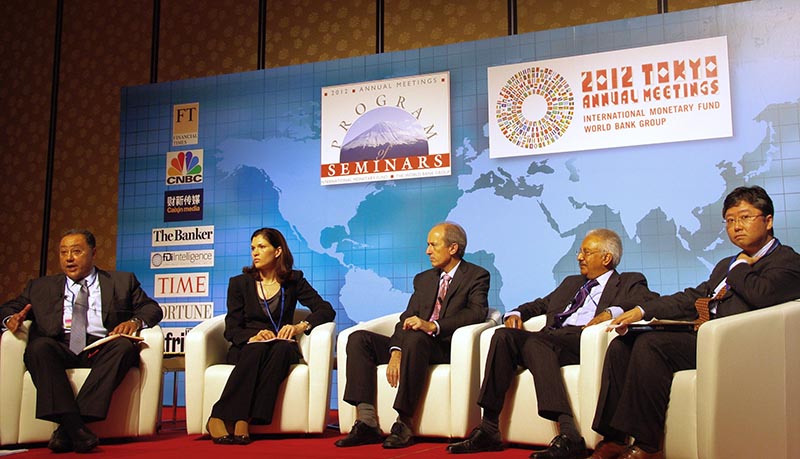The World Bank and JICA Co-Hosted a Seminar at the IMF/WB Annual Meetings
2012.10.16
At the Annual Meetings of the International Monetary Fund and the World Bank, the Program of Seminars (POS), the main event of the Meetings, were held from October 10 to 13. As part of POS, the World Bank and JICA co-hosted a seminar entitled “Can Government Policies Lead to Good Jobs for Development?” in Tokyo on October 12.
This seminar, focusing on how government policies can contribute to job creation, aimed to discuss whether jobs can act as an effective tool for especially low-income countries to sustain growth, and how government policies can enhance development through jobs, with sharing the experiences of different regions.
In his opening remarks, JICA President Akihiko Tanaka said: “Different countries may opt for different strategies, but whatever their policies are, the outcome should be such that all the members of society should have fair and equal access to jobs. And each government should consider its policy for creating jobs that best suits the labor market of each country.”
Following the remarks, Hafez Ghanem, Senior Fellow of the Brookings Institution, chaired this seminar with four panelists: Laura Alfaro, Professor of the Harvard Business School; Newai Gebre-Ab, Chief Economic Adviser to the Ethiopian prime minister; Martin Rama, World Bank Senior Economic Adviser; and Yasuyuki Sawada, JICA-RI Visiting Fellow and Professor of the University of Tokyo.
Dr. Rama, Director of “The World Development Report (WDR) 2013,” noted that this was the second time that WDR picked up the theme of jobs. He continued that 200 million people were unemployed amid the slow recovery from the global economic crisis, and that about 600 million new jobs would have to be created, the majority of them in Asia and sub-Saharan Africa between 2005 and 2020 in order to keep employment as a share of working-age population constant. Meanwhile he stressed: “Though the number is important, we need to consider jobs in the light of improving living standards, productivity growth and social cohesion.”
Dr. Newai Gebre-Ab from Ethiopia, one of the 24 selected countries in the WDR 2013, explained the job situation in Ethiopia: “A large number of the population is still engaged in farming, while urbanization is only 20 percent.” He added that jobs in urban area were concentrated on infrastructure, such as housing construction and transportation system, rather than on manufacturing industry and that the infrastructure in urban area was supported by the labor-intensive small contractors or enterprises. As the future challenge, he stressed the need to shift jobs to the manufacturing sector, as well as to secure government fund and build capacity development.
Dr. Laura Alfaro from Costa Rica, introducing cases from her country, underlined the importance of education including technical training, together with the government's role in sustaining macroeconomic development and the need of formulating policies to create jobs in the private sector, especially for the young. She also touched on the gender imbalance in labor force, stressing the need for social support networks including day-care centers for women who seek jobs.
Dr. Sawada gave a speech on the urbanized job situation in Bangladesh— covered in the WDR 2013—focusing on the importance of infrastructure development and transformation in the employment structure. First, he pointed out that improvements in infrastructure, such as irrigation systems in farmland, and in transportation system between villages and cities, enabled the smooth shift from the unskilled workforce in agriculture to non-agricultural sectors. This shift created more jobs for women in the garment industry. As a result, this triggered social impact on women: the total fertility rate* decreased from 5.1 in 1989 to 2.3 in 2011; the enrollment rate of girls in elementary and secondary schools is now higher than that of boys.
Chairperson Hafez Ghanem wrapped up the seminar, raising the key issues discussed at the seminar—creating jobs in the course of development, fostering an environment to fulfill the increasing demand for jobs, and the relevance to the global economy including foreign direct investment and migration of workers. These are the agendas to be further discussed, he concluded.
* The total fertility rate is the number of children a woman has on average in her lifetime.


事業事前評価表(地球規模課題対応国際科学技術協力(SATREPS)).国際協力機構 地球環境部 . 防災第一チーム. 1.案件名.国 名: フィリピン共和国.

事業事前評価表(地球規模課題対応国際科学技術協力(SATREPS)).国際協力機構 地球環境部 . 防災第一チーム. 1.案件名.国 名: フィリピン共和国.

事業事前評価表(地球規模課題対応国際科学技術協力(SATREPS)).国際協力機構 地球環境部 . 防災第一チーム. 1.案件名.国 名: フィリピン共和国.

事業事前評価表(地球規模課題対応国際科学技術協力(SATREPS)).国際協力機構 地球環境部 . 防災第一チーム. 1.案件名.国 名: フィリピン共和国.

事業事前評価表(地球規模課題対応国際科学技術協力(SATREPS)).国際協力機構 地球環境部 . 防災第一チーム. 1.案件名.国 名: フィリピン共和国.
scroll